What Causes Hyperpigmentation? [According to Experts]
Hyperpigmentation (uneven skin pigmentation) is a common skin complaint, which appears frequently on the face, hands, and other parts of the body that are frequently exposed to the sun.
What causes hyperpigmentation?
Knowing your anxiety, this post will outline the multiple kinds and explain what causes hyperpigmentation on face and body as well as how to reduce dark spots or patches.
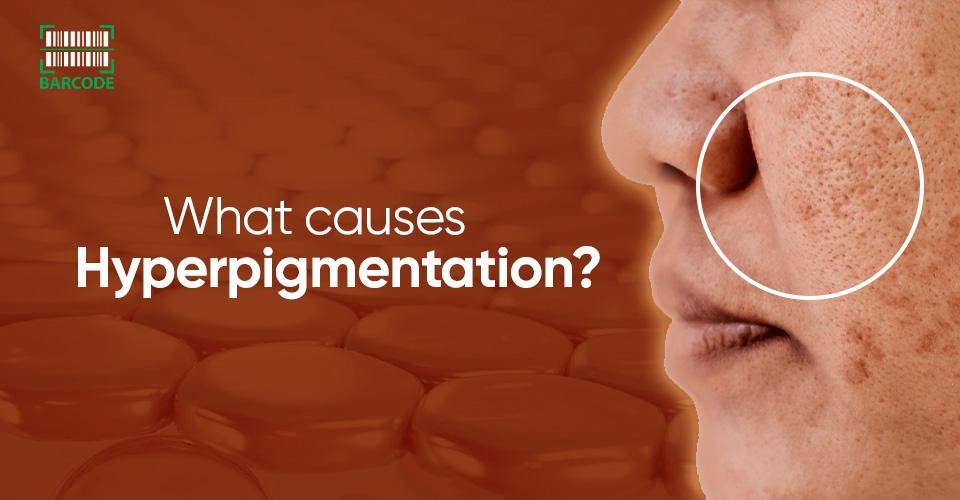
What causes hyperpigmentation?
What Is Hyperpigmentation?
Hyperpigmentation is a common skin condition in which certain areas of the skin are darker than others.
"Hyper" denotes more, whereas "pigment" denotes color.
Hyperpigmentation can manifest as brown, black, gray, red, or pink patches or blotches.
The spots are also known as aging spots, sun spots, or liver spots, which can appear in a single location of the body or all over.
Moreover, hyperpigmentation is at the root of skin problems, including melasma and post-inflammatory hyperpigmentation.
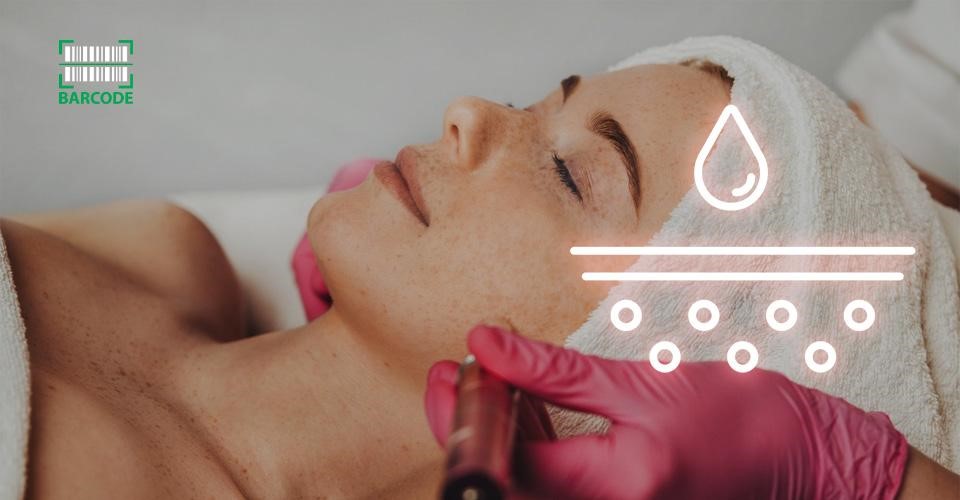
Hyperpigmentation definition
What Are the Types of Hyperpigmentation & Symptoms?
Hyperpigmentation comes in a variety of forms and the most prevalent ones are melasma, age spots, and post-inflammatory hyperpigmentation.
Melasma
Also called chloasma, hyperpigmentation melasma dark skin is thought to be caused by hormonal imbalances and might appear during pregnancy.
It can occur everywhere on the body, although it is more frequent on the stomach and face.
In addition, melasma affects both men and women, yet is more frequent in women, particularly 10-15% of women during pregnancy and 10-25% of oral contraceptive women.
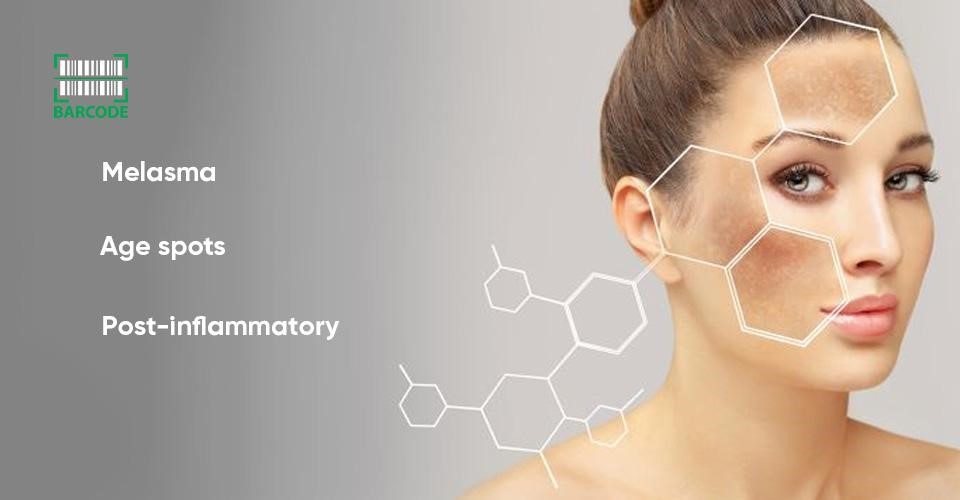
Types of hyperpigmentation
Age spots
Sun exposure is the main cause of pigment spots like age spots (also known as sun spots).
They are connected to long-term, excessive solar exposure. As a result, they are more common on exposed body regions, including the face, neck, décolleté, hands, and arms.
Little, darker skin patches are the norm.
Post-inflammatory hyperpigmentation
Post-inflammatory hyperpigmentation happens when a skin infection or trauma heals and leaves a flat area of discoloration behind.
It is frequently observed in acne patients and may also result after aesthetic operations including dermabrasion, laser therapy, and chemical peels.
Here is the comparison table of these 3 types and symptoms that you can easily recognize!
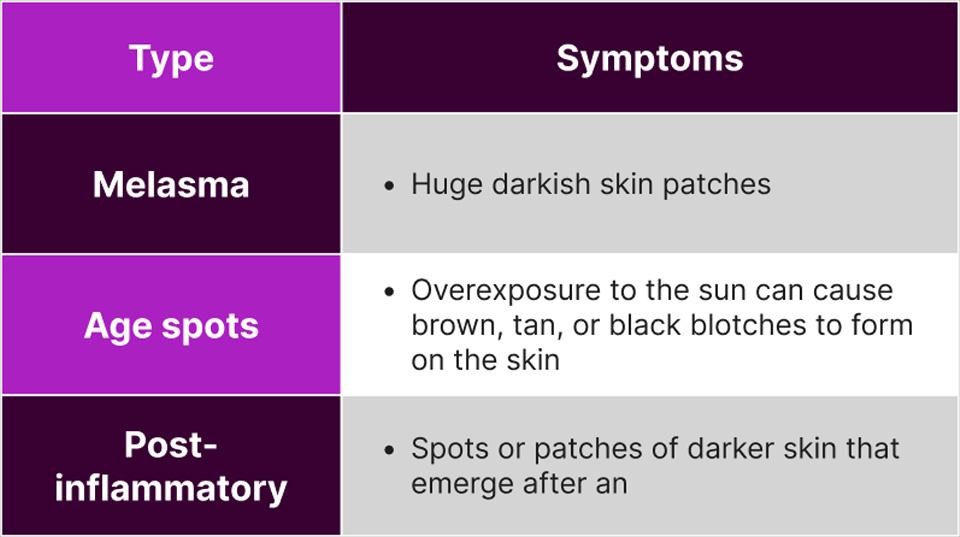
3 hyperpigmentation types
What Are the Causes of Hyperpigmentation?
Are you wondering what cause hyperpigmentation? Actually, an increase in melanin is what caused hyperpigmentation. Melanin is the natural pigment giving our skin, hair, and eyes color.
Sun exposure, hormonal effects, aging, skin injuries or inflammation, and many other factors trigger dark spots on your face and body.
Sun exposure
Because sunlight stimulates melanin formation in the first place, sun exposure is the major cause of hyperpigmentation.
Melanin acts as your skin's natural sunscreen, protecting it from harmful UV rays and causing it to tan in the sun.
Excessive sun exposure, on the other hand, may disrupt this process and cause hyperpigmentation.
After dark spots have formed, sun exposure can aggravate the problem by darkening age spots, melasma, and post-inflammatory hyperpigmentation patches.

Sun exposure is what cause hyperpigmentation
Hormones
This element is more common in women and is thought to develop when the female sex hormones estrogen and progesterone cause excess melanin to be produced when skin is exposed to sunlight.
Some hormone therapy may also cause hyperpigmentation.
Skin injury inflammation
Post-inflammatory hyperpigmentation occurs as a consequence of skin damage or inflammation, such as cuts, burns, chemical exposure, acne, Atopic Dermatitis, or Psoriasis.
When the wound has healed, the skin becomes darker and discolored.
Medical conditions
In certain circumstances, hyperpigmentation is a sign of an underlying medical problem, such as Addison's disease.
If you are unsure about what causes hyperpigmentation face, it is always advisable to get expert treatment from your doctor or dermatologist.
Hyperpigmentation can happen when iron levels are five times higher than the average.
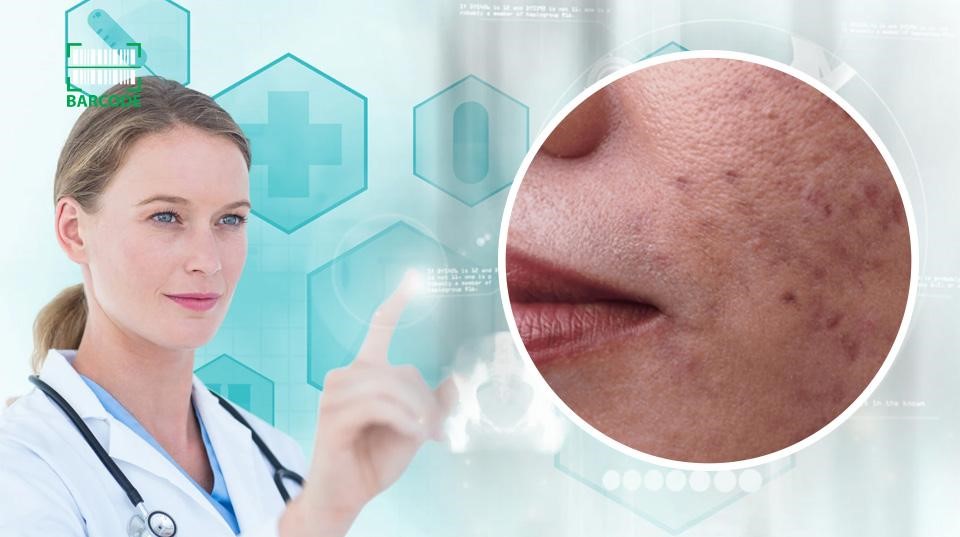
Medical conditions can cause dark spots
Melasma in pregnancy
Areas of dark pigmentation, most commonly found on the face, might signify hormonal abnormalities. It is largely, but not entirely, linked to pregnancy hormones.
During pregnancy, melasma is commonly referred to as the "mask of pregnancy."
Those with lighter to darker skin tones are more likely to get it, and it may run in families.
Reactions to drug use
Hyperpigmentation can be caused by antimalarial medications and tricyclic antidepressants, for example.
Patches of skin may develop gray in some circumstances. Topical therapy chemicals can also induce hyperpigmentation.
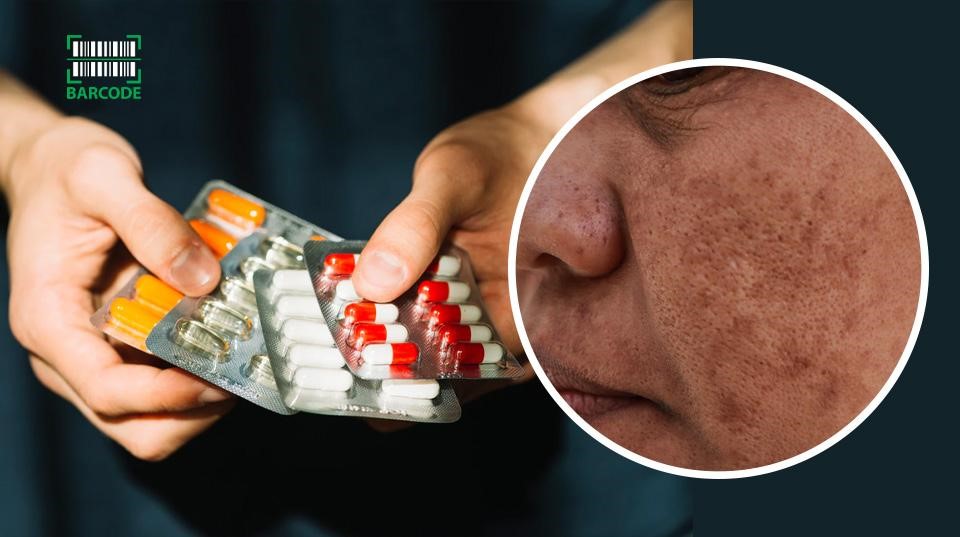
Hyperpigmentation can be caused by reactions to drug use
To know some best treatments for hyperpigmentation on face, visit Barcode Live!
How Is Hyperpigmentation Diagnosed and Treated?
A dermatologist may figure out what is causing your dark spots. They will ask about your medical history and do a physical examination to establish the cause.
A skin biopsy might help to narrow down the etiology in some circumstances.
Besides, certain forms of hyperpigmentation can be treated with topical prescription medicine. Axis-Y Dark Spot Correcting Glow Serum 50ml is our recommended topical medicine for you.
This drug often contains hydroquinone, a skin-lightening agent.
Nevertheless, long-term use of topical hydroquinone (without pauses) can induce skin darkening, a condition known as ochronosis.
Hence it's recommended to use topical hydroquinone only under the supervision of a dermatologist, who will be able to correctly instruct you on how to take the drug without causing any side effects.
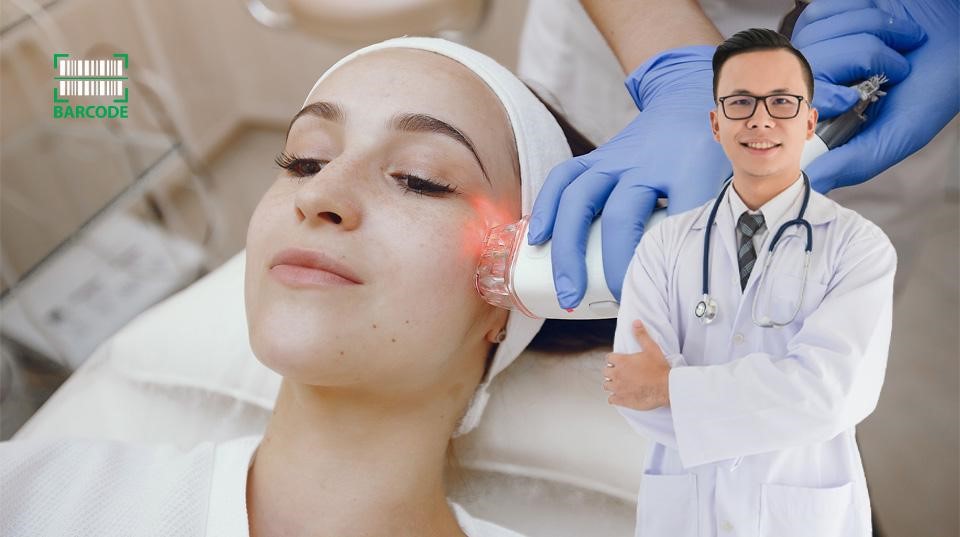
How hyperpigmentation is diagnosed and treated
How to Prevent Hyperpigmentation?
Although hyperpigmentation cannot always be stopped or prevented from growing more pronounced, there are certain methods to lower the risk.
-
Use sunscreen every day. Choose a sunscreen with an SPF of 30 or higher that is "wide spectrum" (blocks UVA and UVB rays)
-
Try to stay out of the sun, especially when it's at its most intense
-
Use physical blockers like zinc oxide or titanium dioxide
-
Put on caps and protective clothes

Tips to prevent hyperpigmentation
-
After an injury or when there are spots, scabs, or acne, refrain from picking at the skin.
-
To brighten dark areas, seek professional guidance before doing so since it may result in side effects.
-
To lighten your complexion overall, stay away from skin-whitening creams.
Besides, some natural treatments can help you deal with dark spots right at home. Refer to our guide on “How to get rid of hyperpigmentation naturally?” for more details!
It may take some time for hyperpigmentation fading once the cause has been diagnosed and treated.
It typically takes 6-12 months for an area that is a few shades deeper than your natural skin tone to go away.
Yet, fading may take years if the color is well ingrained in your skin.
If your skin is any of the following, you should visit a doctor, such as a dermatologist:
Red
Touching it feels hot
Itchy
Painful
Leaking any liquid, including blood or pus
Many products claim to be able to reduce hyperpigmentation. Consult your doctor to determine which products are effective and appropriate for you.
Final Thoughts
Although hyperpigmentation can make you feel self-conscious, it is a fairly common condition. Changes in lifestyle and treatments may be helpful. So, we hope that with our guide on what causes hyperpigmentation and how to prevent it, you will soon get your youthful skin back.
Source:
https://www.medicalnewstoday.com/articles/186235#types
https://www.ncbi.nlm.nih.gov/books/NBK430862/
https://www.ncbi.nlm.nih.gov/pmc/articles/PMC2991712/
https://www.aad.org/public/diseases/a-z/melasma-causes
https://www.aocd.org/page/Hyperpigmentation
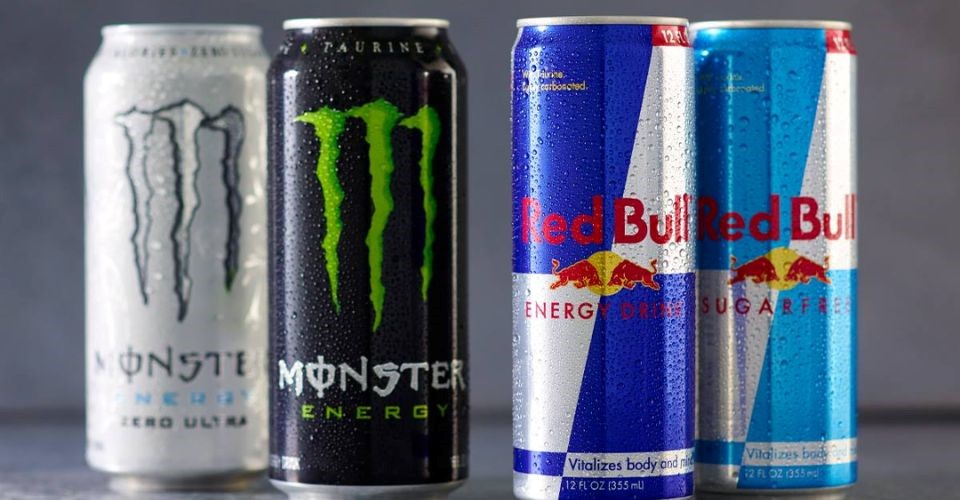

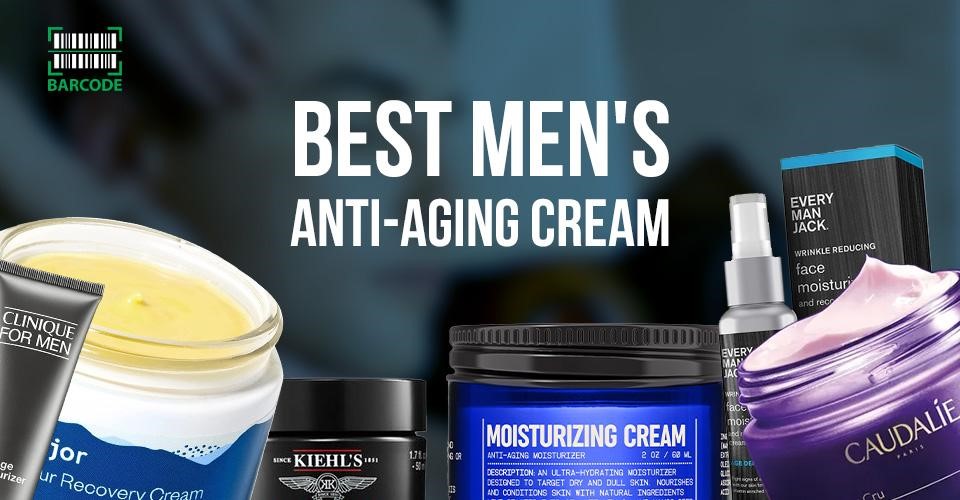
6 Comments
Autumn Houston
Awesome! No words. You always go one step beyond
Leave a Comment
Your email address will not be published. Required fields are marked *Barcodelive
Thanks
Leave a Comment
Your email address will not be published. Required fields are marked *Kim Subramaniam
What are the home remedies for hyperpigmentation due to acne in face?
Leave a Comment
Your email address will not be published. Required fields are marked *Barcodelive
This article can help: https://barcodelive.org/how-to-get-rid-of-hyperpigmentation-naturally
Leave a Comment
Your email address will not be published. Required fields are marked *Nolan Waters
Always blown away by your awesome content. Great job
Leave a Comment
Your email address will not be published. Required fields are marked *Barcodelive
I appreciate that
Leave a Comment
Your email address will not be published. Required fields are marked *Leave a Comment
Your email address will not be published. Required fields are marked *